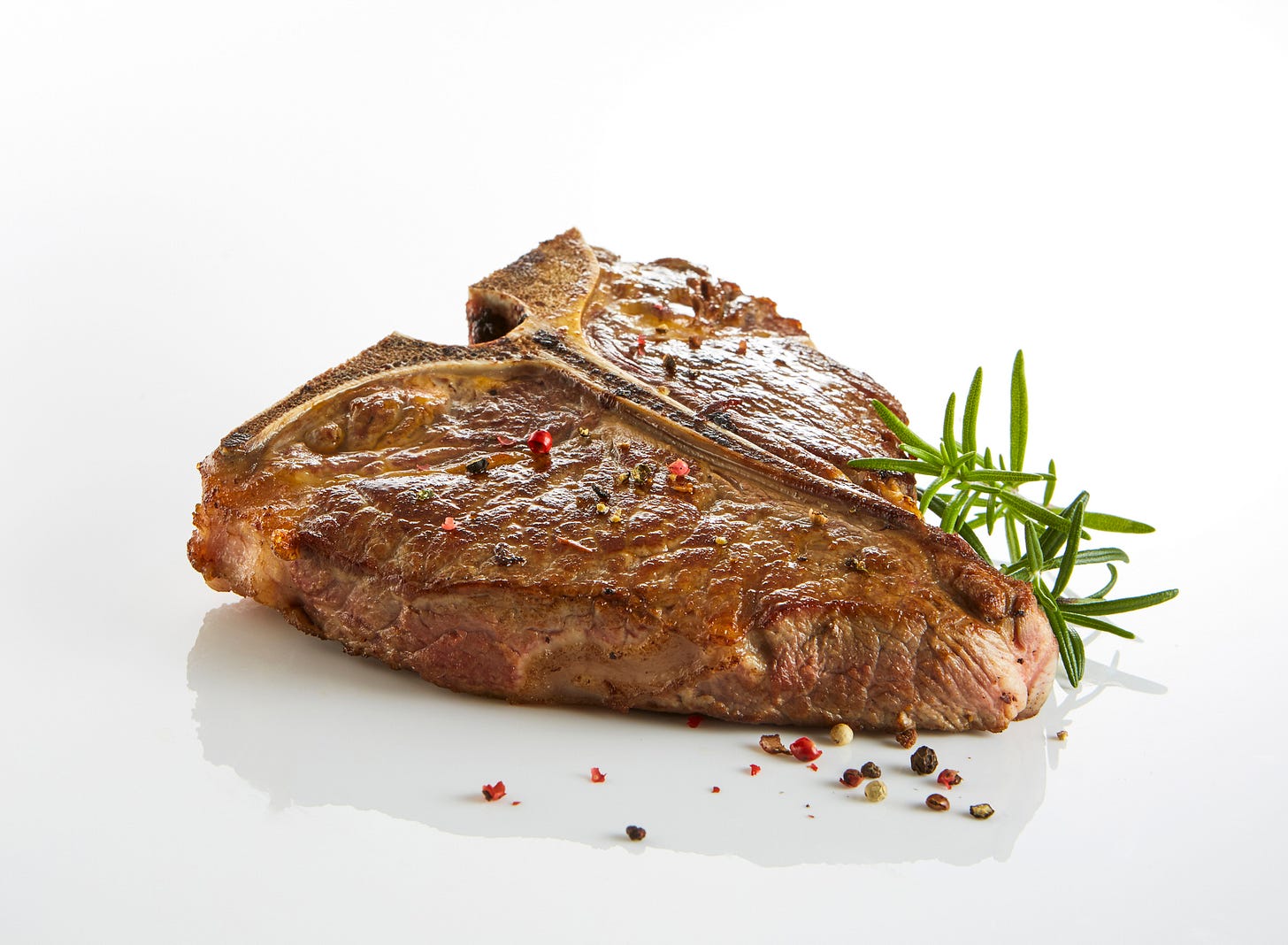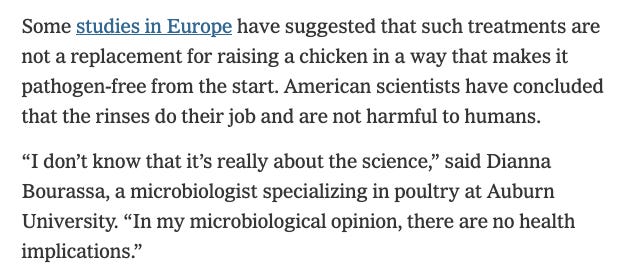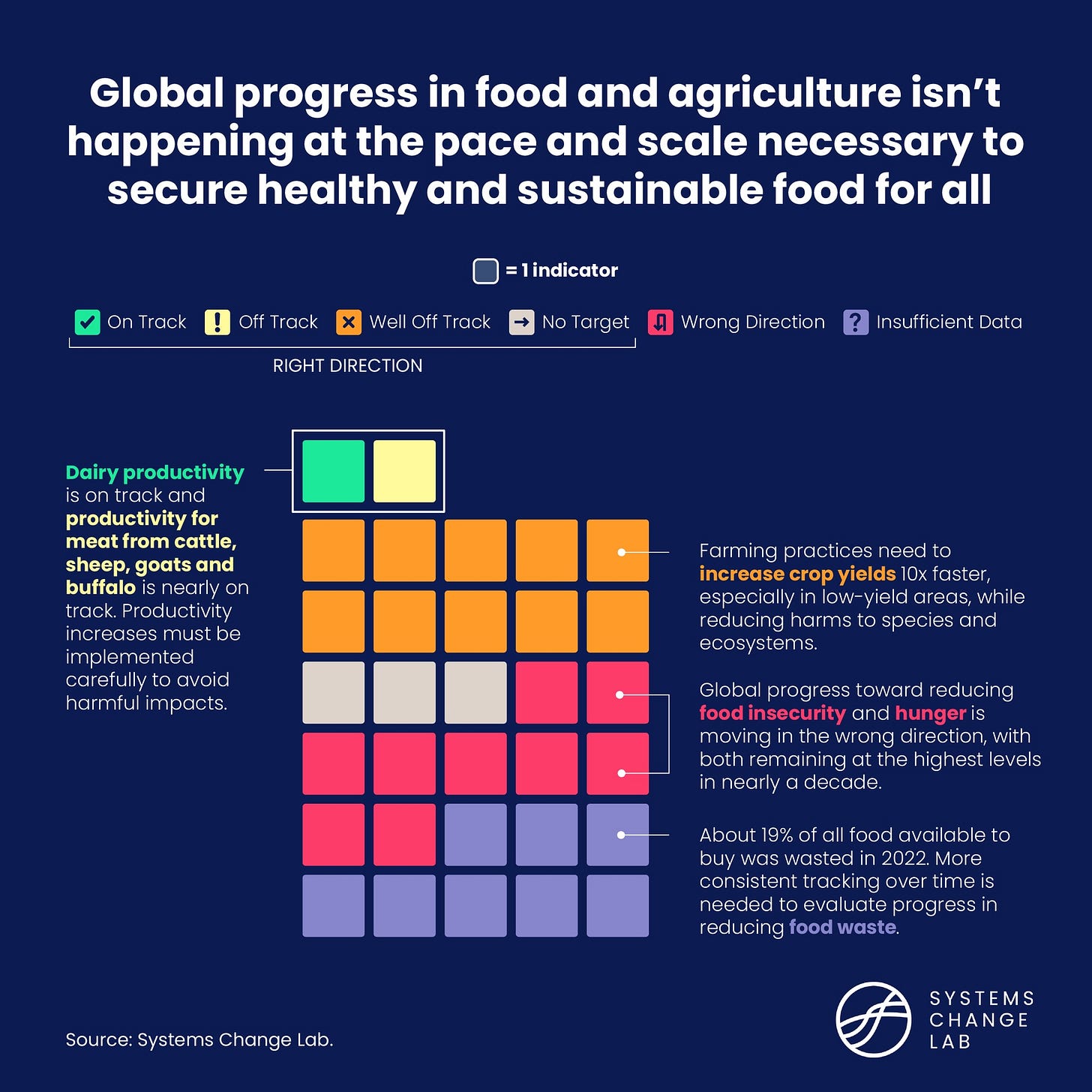Faustian Bargains?
When we prioritise profit over principles in the global food system
Is it just me or do you also feel like we’re living in a state of permanent suspense and disbelief?
Will India and Pakistan go to war? What will Russia do in Turkey? How bad must conditions get in Gaza, where famine is already looming, for governments to pressure Israel?
What will Trump and his acolytes destroy next? Where are we with the tariffs? Should I be stocking up on dry foods and cash in case of blackouts, hacker attacks, or trade wars?
In side conversations in Geneva last week, a few questions kept coming up: what’s happening to the humanitarian sector and how do the changes affect the world?
I guess all this anxiety is an inevitable result of living in interesting times.
How is everyone dealing with it? Any tips, besides watching re-runs of Bridgerton? I’d very happily trade a few hours of my life for some froth.
This thought + a few developments this week got me thinking about the trade-offs we make.
We make these decisions in our daily lives, on issues that are both mundane and significant. Chicken, beef, or chickpeas for lunch? Cook at home or eat out? Property or savings? Carrot or stick?
Based on the information and resources we have, we take calculated risks, give up something in exchange for another, and often tell ourselves this is how things work. But can we imagine an alternative? Is there an alternative?
Our Right to Cheap Meat vs. Animals’ Right to a Decent Life
Trade deals and trade wars have been hogging the headlines for a few weeks now but this NYT feature from Sunday about the differing standards of food safety between the U.S. and Europe struck me in a way that others didn’t.
“Why America’s ‘Beautiful Beef’ Is a Trade War Sore Point for Europe” took its title from a remark by a Trump appointee.
I’ve read multiple articles reporting these comments and even video clips of that quote where he also talked about chickens and lobsters. Yet I’m none the wiser why he thinks this way.
Is it because American beef, unlike Europe’s, is full of hormones and growth stimulants and therefore big and strong in a traditional sense, albeit achieved through artificial means?
The article went on to talk about how Europe’s strict health and safety standards “keep many foreign products off European grocery shelves” and the American complaint that these standards are “more about preference than actual health”.
It also pointed out that the term “chlorinated chickens” is dated because “American farmers have for years been using a vinegar-like acid, and not chlorine, to rinse poultry and kill potential pathogens.”
There wasn’t a single line about what it means for the animals to be raised in these conditions.
In massive feedlots, cattle in crowded sheds are given hormones to fatten them up quickly so they can be slaughtered as soon as possible. And surely requiring an acid-wash to clean chickens after they were killed meant shortcuts were taken in the way they were raised?
I was disturbed by the framing of the discussion as purely about human health, without any consideration for the health and well-being of animals. But The NYT isn’t alone in this. Most mainstream media outlets took the same stance.
As the article said, the EU does have stricter standards but it is also mostly to safeguard human health. Attempts to improve animal welfare in the bloc have been stridently resisted by the powerful meat lobby despite overwhelming public support. I’ve reported on this before: see here and here.
I guess this is the consequence of the trade-off we have made. We decided to turn a blind eye to how animals are raised so we can eat meat and dairy every meal. We decided it was OK to pump animals full of stimulants, raise them in unsanitary environments, and confine them in cages.
Is it because, like the scientist, professor and author Robin Wall Kimmerer observed, in English language, plants and animals are an it and only humans are accorded the elevated status of a who? We see them as less than us and place them in the same level as inanimate objects like tables, chairs, mobile phones, and computers.
I was born and raised in a carnivore household. I’m still practicing it. I love bacon, San Daniele ham, and chicken drumsticks. Icelandic lamb is the best there is. I struggle to resist if I see duck on a menu.
So I get how difficult it is to give up meat completely. But I also believe we don’t need to eat it as often or as much as we’re doing now.
Simplification Now vs. A Sustainable Future
The buzzword in Brussels these days is “simplification”, a close sibling of “cutting red tape” and “reducing administrative burden”.
On Wednesday, May 14, Christophe Hansen, the European Commissioner for Agriculture and Food, posted a triumphant message on LinkedIn about delivering a proposal to simplify the Common Agricultural Policy (CAP), a gargantuan and unwieldy subsidy scheme that is the largest item on the EU budget.
A scheme that has been repeatedly criticised for funding mostly large landowners, not the small-scale producers most Europeans think should be receiving support.
“The changes could save up to €1.58 billion annually for farmers and €210 million for national administrations, while making payments, certain requirements, and crisis tools more flexible and easier to manage,” the press statement announcing the simplification package said.
The changes also include “simplified environmental requirements and controls” which green groups and academics say is EU-speak for stripping away whatever little green measures there are left.
The European Environmental Bureau (EEB) pointed out that simplification would:
Reduce the areas of permanent grassland which act as key carbon sinks (but which emit greenhouse gases when ploughed),
Weaken the protection of peatlands and wetlands which are also carbon sinks,
Remove links between the CAP and key environmental and climate legislation.
Corporate Europe Observatory (CEO), a Brussels-based watchdog, said overall, the latest recommendations “further reduce the scope for an European agricultural policy that truly helps fight the climate and biodiversity crises”.
Giving more power to member states will not help ecosystems under stress and instead will undermine future food security, it warned.
The Commission’s legislative proposal will now be submitted to the European Parliament and the Council for adoption.
The backtracking on green goals has been months in the making, so this wasn’t unexpected but it is still a crying shame, given that the Strategic Dialogue on the future of Agriculture provided an ambitious and clear-eyed roadmap to align food and climate concerns.
The announcement also came hot on the heels of months of escalating attacks on civil society, especially green groups, by the most powerful political group in the EU parliament.
The centre-right European People’s Party (EPP), together with the far-right, has been using “Trump-style tactics” and being “hypocritical”, said Dutch investigative outlet Follow The Money.
It lost the latest round, when last week’s Parliamentary vote kept the Commission’s small but significant funding for civil society groups. But the battle is far from over.
Those who see green goals as nuisance are willing to trade a clean and sustainable future for short-term private gain. This is particularly unconscionable given that Europe is the world’s fastest-warming continent and European farmers are already suffering from higher temperatures, droughts and floods.
Our Survival vs. Survival For Future Generations
If a trade off is a balance between two desirable but incompatible positions, what do you call it when you have a clear winner but chooses to ignore it? Asking for a friend.
Last month, during the 177th Session of the FAO Council, a governing body of the U.N. food and agriculture agency, the United States delivered a speech which included this little zinger.
The speech also included muddled thoughts around DEI and belligerent-sounding remarks that the U.S. is no longer committed to the Sustainable Development Goals (SDGs), but the sheer stupidity and anti-science nature of the comment on climate really takes the cake.
Because here’s what climate change is doing to America’s crops.
In 2024, Michigan’s sweet cherry industry, which produces 75% of the national total production, lost roughly 75% of its crop to bad weather.
In 2023, 28 weather disasters caused over $21 billion in crop losses, the American Farm Bureau Federation said.
In 2022, prolonged drought in California caused $2 billion in agricultural losses and decimated nearly 20,000 jobs, according to researchers.
Given their “America First” ethos, you’d think they would care about what climate change is doing to their farmers and agribusinesses. But I guess they’d rather trade people’s lives and livelihoods to own the “woke” libs?
Anyway, I digress. I’ve written about agriculture and climate change as “an unhappy marriage” for the umpteenth time and we ignore this relationship at our own existential risk. For god’s sake, one-third of global greenhouse gas emissions come from our food systems!
Don’t just take my word for it. A few recent reports are driving this point home.
Firstly, an assessment published May 12 by the Integrated Food Security Phase Classification (IPC) warned that “the Gaza Strip is still confronted with a critical risk of Famine”.
“Over 60 days have passed since all humanitarian aid and commercial supplies were blocked from entering the territory. Goods indispensable for people’s survival are either depleted or expected to run out in the coming weeks. The entire population is facing high levels of acute food insecurity, with half a million people (one in five) facing starvation.”
“Immediate action is essential to prevent further deaths, starvation and acute malnutrition, and a descent into Famine. This entails ending hostilities, ensuring unrestricted humanitarian access, restoring essential services and commercial flows, and providing sufficient lifesaving assistance to all in need.”
Guess who’s majorly responsible for the dramatic cuts in food aid of the kind that Gazans desperately need?
The same U.S. administration, which is backing an Israeli plan that would dismantle the existing humanitarian system for a military-controlled one where “logistics and distribution hubs” will be placed near Israeli military positions.
It will be run by the Geneva-based Gaza Humanitarian Foundation, “a newly registered nonprofit with unclear humanitarian expertise”, according to The New Humanitarian.
Secondly, on May 14, research that assessed 32 food and agriculture indicators against key climate, biodiversity and equity targets came out. A single indicator - dairy productivity - is “on track”. See screenshot above.
Nearly 70% are either “off track”, “well off track” or heading entirely in the wrong direction. These include “hunger”, “pesticide use intensity”, “rice cultivation emissions intensity”, and “the population unable to afford a healthy diet”, said Systems Change Lab, an initiative co-convened by World Resources Institute and the Bezos Earth Fund.
“Even if fossil fuel emissions are fully phased out, food-related emissions alone are projected to exceed the levels needed to limit global warming to 1.5°C unless significant changes are made to food production and consumption. To transform the global food system by 2050, we will need to simultaneously improve food production practices, reduce food loss and waste, and shift diets.”
Finally, on May 16, the 2025 Global Report on Food Crises was released.
It found nearly 300 million people in 53 countries faced high levels of acute food insecurity in 2024, a sixth consecutive annual increase. The authors identified four key factors driving it: conflict and insecurity, economic shocks, climate change, and crippling cuts in aid and development funding.
Conflict is the main driver for pushing more people on the verge of famine in places like Palestine and Sudan. My home country, Myanmar, is among the 10 countries with the largest number of populations facing food crises.
As long as we have politicians who have made wilful blindness a feature, not a bug, we will fail to turn the tide on the rising number of hungry people in this world.
Our representatives may have made Faustian bargains for political expediency and personal gain. But we don’t have to make their bargains our own. We must speak up.
Thin’s Pickings
Three things we learned about Sam Altman by scoping his kitchen - Financial Times
Brilliant and appropriately-biting piece from Bryce Elder about what he learned from scrutinising a video of Sam Altman - he of OpenAI/ ChatGPT fame - cooking. Start your weekend by reading this. You won’t regret it.
Import dependence for nitrogen supply - CAP Reform
A piece by Alan Matthews, one of the best experts out there on European agriculture and CAP, on the EU’s dependence on imported nitrogen. This is a strategic vulnerability for Europe because production of nitrogenous fertilisers is becoming even more concentrated, he wrote.
Who Will Stand Up for the Rio Grande? - The Border Chronicle
Pablo De La Rosa argues that the drying up of the river, a critical source of water in a region of limited rainfall, and the subsequent water scarcity is the real emergency along the border.
On Food Media - From the Desk of Alicia Kennedy
“For the most part, food is a subject that everyone thinks they’re an expert on, and because of this, they don’t dig too deep into the multi-faceted questions that emerge when one considers the reality of how what we eat gets from seed to plate.”
Great read.
As always, please feel free to share this post and send tips and thoughts on bluesky @thinink.bsky.social, mastodon @ThinInk@journa.host, my LinkedIn page, twitter @thinink, or via e-mail thin@thin-ink.net.










